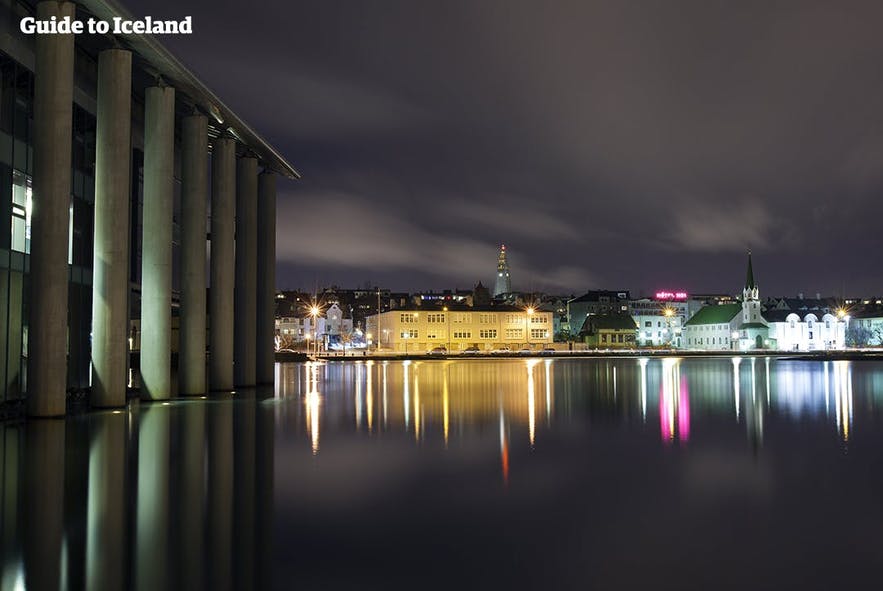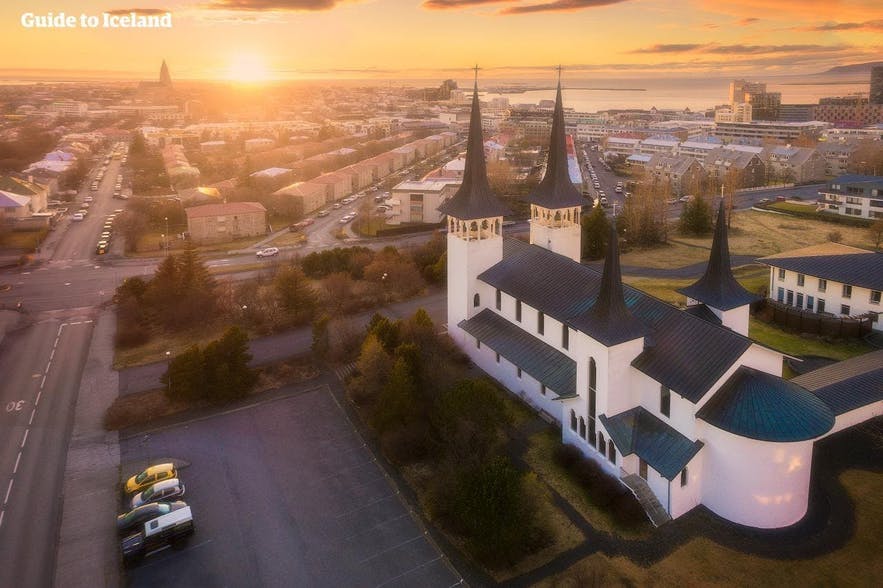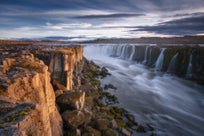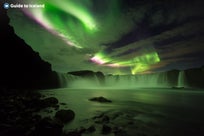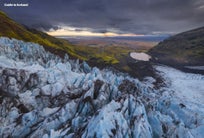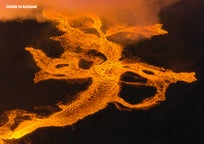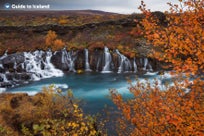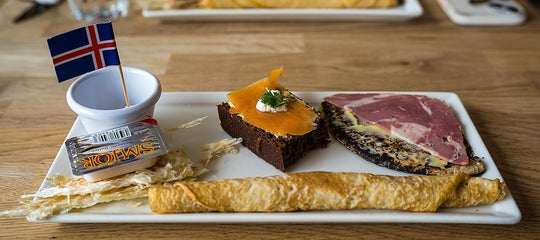
National Holidays in Iceland | Traditions & Dates


What are Iceland's public holidays and on which days to they occur? Are shops and restaurants open during official vacation days in Iceland? Where and how can you join the festivities and enjoy an authentic Icelandic experience? Read on for a complete guide to Icelandic holidays and the traditions surrounding them.
- Discover the fascinating History of Iceland
- Find out everything you need to know about the Best Annual Events in Iceland
The Icelandic calendar is rich in bank holidays, boasting no less than fifteen leisurely days a year. A majority of the working population, as well as students and school children, can enjoy these days off in the embrace of family and friends.
During these days, you can expect most stores to be closed. In Reykjavík, however, many bars and restaurants will still be open for business and those who do have to work can look forward to being paid extra to show up on these dates.
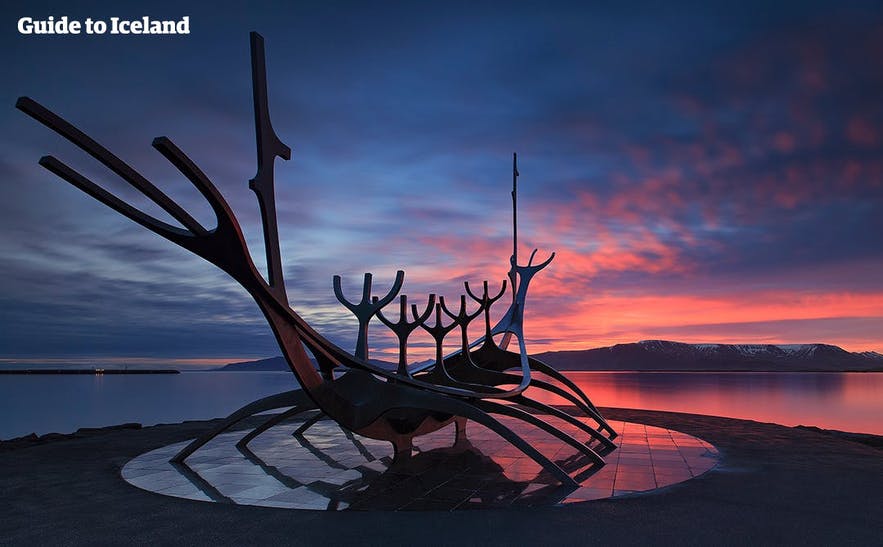
Many public holidays are steeped in unique celebratory traditions, and the shared practice of these customs creates a strong feeling of community.
It is during the holidays that you can experience the small-island spirit of Iceland, and if you’re informed as to what’s happening, you can be a part of it! Don’t get caught out and irritated if all the stores are closed (even though locals sometimes complain!). Instead, indulge in a bit of Icelandic culture and join in the festivities.
Public Holidays (2019)
There are many more festive days in the Icelandic calendar, however, the dates included in the table above are exclusively bank holidays.
New Year's Day
What Icelanders get up to on New Year's Day (Nýársdagur) is not radically different from people all over the world. As you will read about later, the locals push the boat out to celebrate the New Year, and parties in Reykjavík's bars only begin at Midnight.
As a large proportion of people choose to imbibe, many spend their New Years Day feeling rather... fragile.
Traditionally, all shops were closed on the 1st of January, and the Downtown of Reykjavík mostly resembled a ghost town. However, due to the rise in tourism in recent years, an increasing number of restaurants and bars are open in the city centre, and those poor souls dragged into work, get paid double!
- See also: The Best Restaurants in Reykjavík
As in many other countries, some Icelanders opt to celebrate the New Year by jumping into the freezing sea to go for a swim. The majority, however, are quite hungover and considering gym memberships or busy making new year's resolutions to never drink again.
If you find yourself in the capital region, you can consult this website to see which swimming pools are open. Laugardalslaug is usually open from 12-18:00 on the 1st of January, and there are not many better ways to settle into the new year than soaking in a geothermally heated pool.
Easter in Iceland
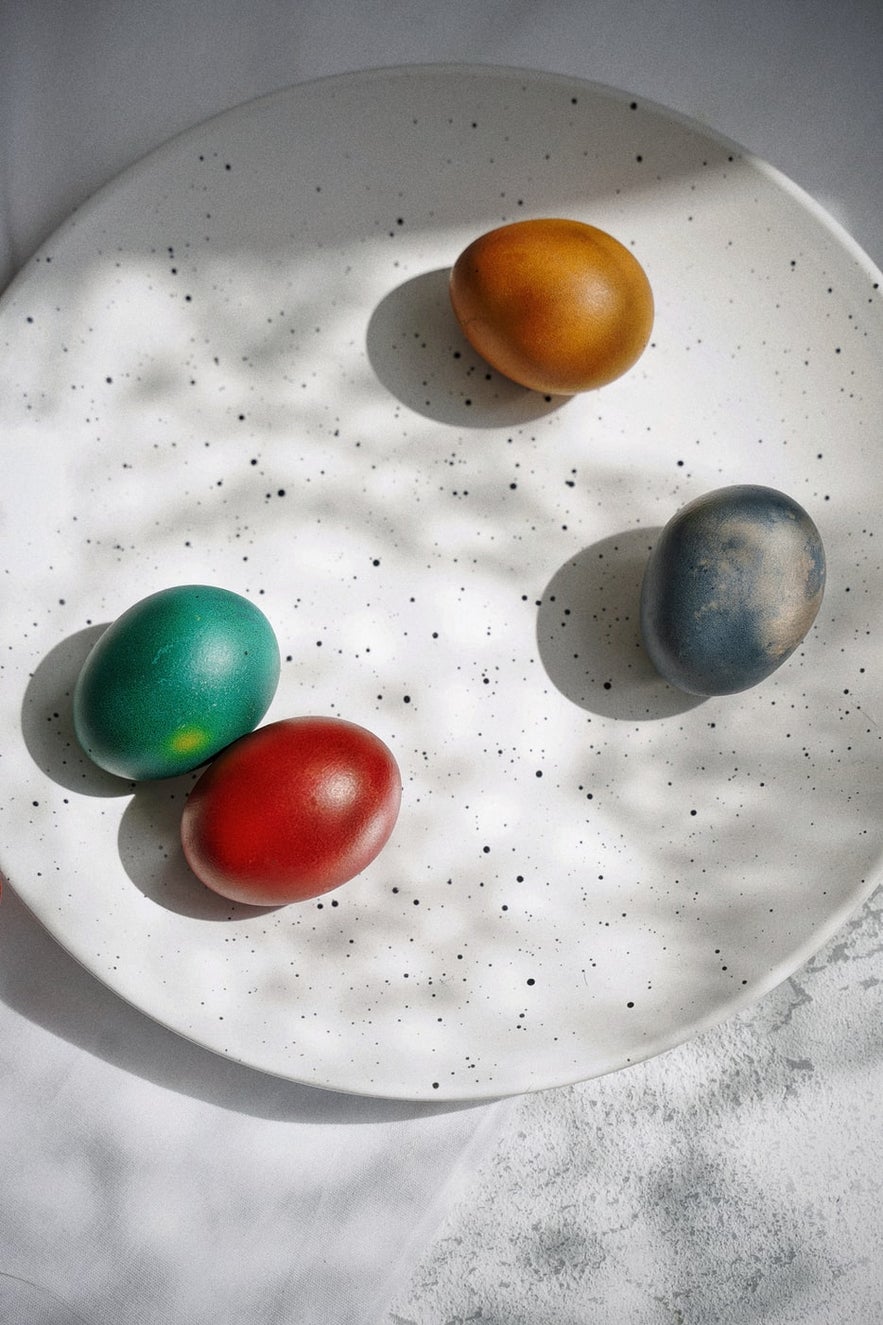 Photo by Olena Sergienko
Photo by Olena Sergienko
Easter (Páska) celebrations are extensive in Iceland and result in a five-day weekend for locals. Although less than 50% of Icelanders would consider themselves religious, the history of Christian rule is still evident in the nation's calendar. Many outdated rules regarding the observance of these dates still linger in Icelandic law although they are rarely enforced.
A large number of 13-14-year-olds go through civil or religious confirmation at this time, a common rite of passage for adolescents in Iceland. The Easter season is punctuated with many grand parties to celebrate this initiation to adulthood and friends and family attend with lavish presents in tow.
Easter is a favourite time of year for many Icelanders; they can enjoy a large amount of delicious food as well as time off work with family without the stress of Christmas shopping. As the weather improves and the days become longer, spirits are considerably elevated during this holiday season.
Maundy Thursday
Maundy Thursday commemorates Jesus Christ's Last Supper with his thirteen disciples and it marks the beginning of Easter. As well as offices and school, many shops will be closed and this is one of the most popular days for young Icelanders to be confirmed.
The Wednesday preceding Maundy Thursday is treated as a weekend in Reykjavík as bars are open late until 03:00 or 04:30 in the morning since many people do not have work the next day (bars usually close at 01:00 AM on weekdays). This is a great opportunity to sample the eclectic and exciting nightlife Reykjavík has to offer. Just be sure to have your shopping finished as the shops won't be open until Saturday!
- See also: Nightlife in Reykjavík
Many swimming pools in Reykjavík are open on Maundy Thursday and Icelanders love to spend their vacation time soaking in the hot pools and hopefully, the sunshine.
Good Friday
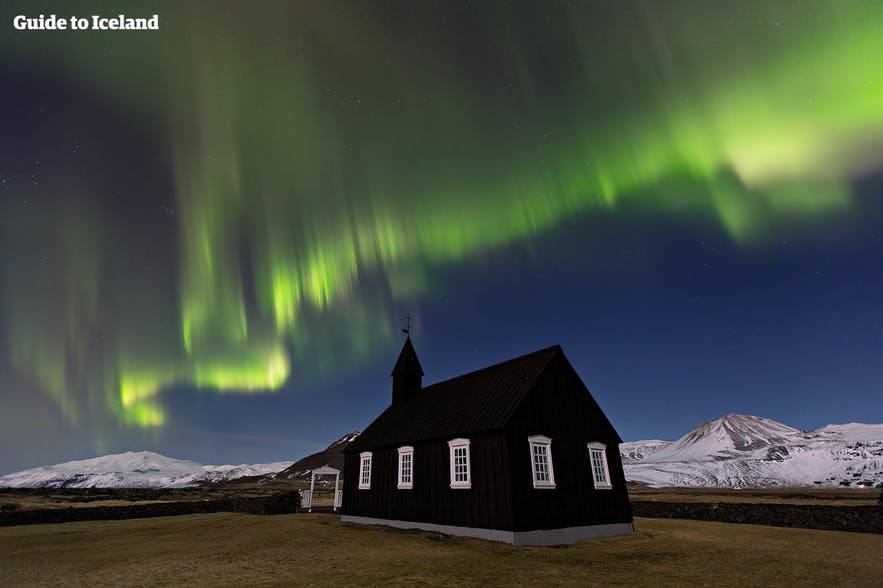
Traditionally, Good Friday is lawfully delineated as a day for solemn contemplation; dancing, gambling, drinking or going to cinema used to be strictly forbidden and technically, illegal. These laws are observed to the degree that bars close at midnight on Maundy Thursday and do not open again until Good Friday is over, exactly 24-hours later.
As a form of protest to these strict Christian laws, Icelandic atheists gather in the square Austurvöllur in Downtown Reykjavík to play a rebellious game of Good Friday Bingo. It's free to play, and there are prizes to be won!
By law, all shops are closed on Good Friday so be sure to stock up on provisions beforehand. The bars open after Midnight on Good Friday so head into the city centre for a drink and a dance with the locals.
Easter Sunday
As with Good Friday, Easter Sunday is officially mandated as a day of solemn Christian observance, although in reality there is a lot more merriment to be had than there is prescribed by law. The Saturday between these two days often entails Icelanders bombarding the shops while they're open, to stock up on supplies to last until Tuesday. Be prepared for long lines!
We couldn't talk about Easter without talking about chocolate; Easter eggs in Iceland are of the highest quality and are sold in all of the supermarkets. Beautifully decorated with a toy chick and fake flowers, Icelandic Easter eggs are packed full of candy on the inside as well as delicious chocolate on the outside.
- See also: Shopping in Iceland
Families will often plan Easter Egg hunts and children are challenged to find their chocolatey reward. Each egg contains an Icelandic proverb which is a highlight of busting open these chocolate treasure chests. Older family members will regularly be requested to explain these witticisms as they can be quite cryptic.
In the afternoon, it's common to celebrate with a home cooked meal which traditionally, is a roasted leg of lamb with all the trimmings. In Reykjavík, bars open after Midnight and only close in the early hours of the morning. Yes, despite seemingly promoting piety on paper, the long Easter weekend can, in reality, be quite a boozy holiday.
Easter Monday
Another free day for schools and offices, Easter Monday does not entail the same religious militancy as Good Friday and Easter Sunday. Icelanders spend this day scoffing what's left of their Easter eggs or returning from holiday homes in the countryside if they've spent their long weekend out of town.
Swimming pools are usually open, and some supermarkets will have limited opening hours.
First Day of Summer
'Sumardagurinn fyrsti', the First Day of Summer has been a public holiday since 1971, but its history goes back further to when Icelanders used the Old Norse calendar which was divided into just two seasons: summer and winter.
Although the weather in April is typically far from summery, the days are becoming longer, and the locals are enthusiastic to put winter behind them. The first true day of summer is widely regarded as the day a migratory bird, the Golden Plover (Lóa), returns to the island to nest.
Although the weather can be notoriously bad on the First Day of Summer, Icelanders still celebrate with parades led by brass bands and scouts, outdoor sporting events and live entertainment all over the country.
- See also: Iceland's Seasonal Contrasts
There is an old superstition that if the temperature drops below zero the night before Sumardagurinn fyrsti, it is a favourable auspice for a fair summer to come. Parents give children a summer gift, an Icelandic tradition which is 400-years older than the custom of giving presents at Christmas.
May Day
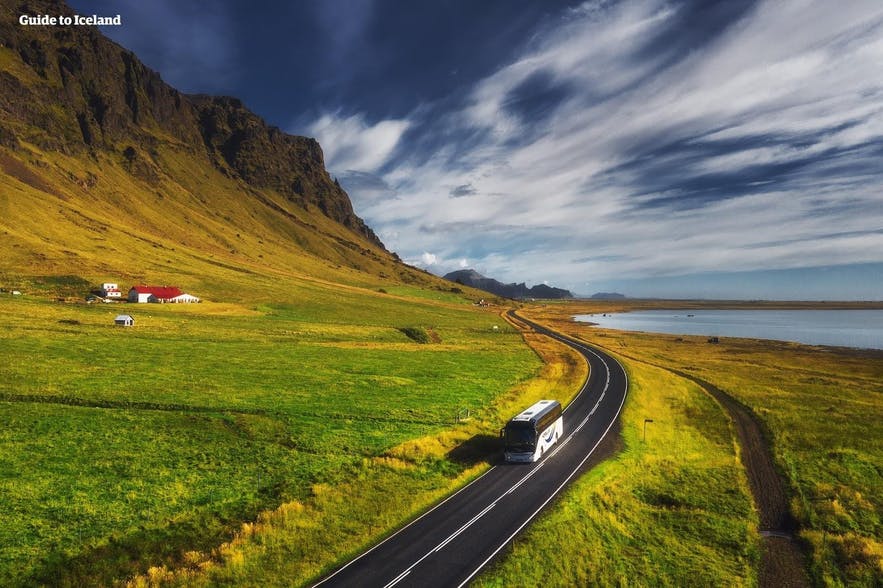
As in countries the world over, May Day in Iceland is a day for general protest. In Reykjavík, people take to the streets to demonstrate against misgivings they may have with the current state of affairs and the procession is led by a brass band down the main shopping street, Laugavegur.
This May Day tradition largely stems from the Cold War when there was an active community of communist sympathisers within Iceland who adopted the custom from other left-leaning groups in mainland Europe.
The first of these marches, however, took place all the way back in 1932 to protest the number of working hours in a week. Events can take place all over the country, however, the largest demonstration is in Reykjavík.
Ascension Day
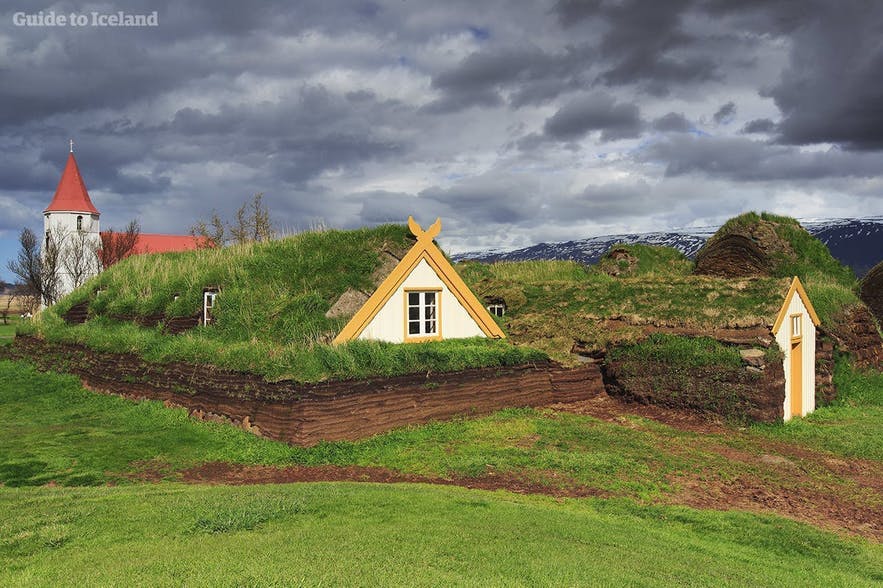
Ascension day is a celebration to commemorate Christ's bodily ascension to heaven, and it occurs 40 days after Easter. It is one of the oldest Christian holidays, and it has been part of the Icelandic Christian calendar since 400 AD. Schools and workplaces are closed although restaurants and bars will be open in the centre of Reykjavík.
The majority of Icelander's will enjoy a day off to spend with family and partake in outdoor activities. Religious Icelanders will go to church and some may engage with the age-old custom of snuffing an Easter candle to symbolise Jesus' holy departure from Earth.
Whit Sunday
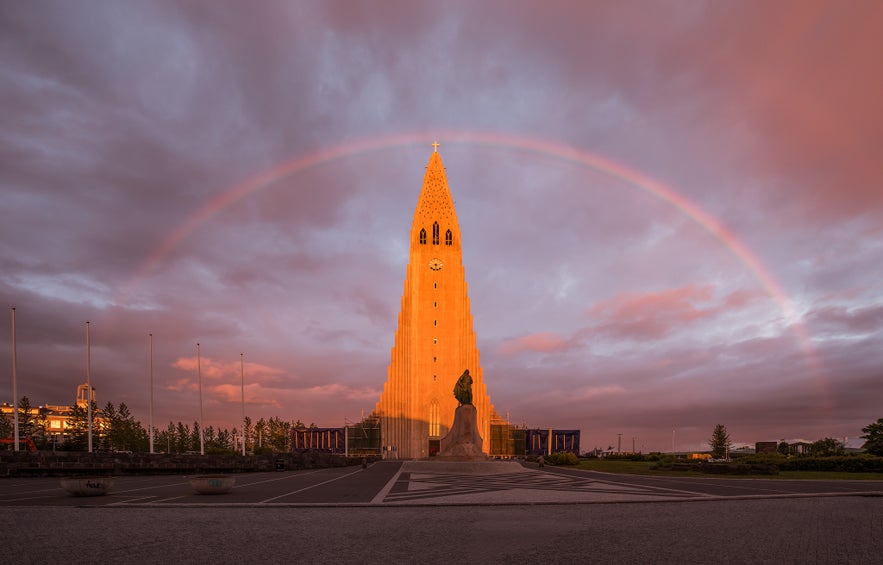
This is not a day for Icelanders to hone their humour but rather, Whit Sunday, also known as 'Pentecost Monday' is once again a Christian holiday, and it occurs 10-days after Ascension Day. Biblically, it marks the day that the Holy Spirit was revealed to the apostles and other followers of Jesus Christ.
Most Icelanders will not be entirely sure of the meaning of this observance but will welcome another day free from school or work. Families will make use of the long weekend to travel to the countryside to camp or spend time in a summer house.
The main supermarkets will be closed; however bars and restaurants will be open for business and tours are likely to run as normal.
Independence Day
This is a day of substantial national importance, and it marks the anniversary of Iceland's independence from Denmark in 1944. The 17th of June is the birthday of the nation's champion for autonomy, Jón Sigurðsson who features on the 500-krona banknote.
Every year, a wreath is laid at the base of his statue in Austurvöllur square in Reykjavík to commemorate his contribution to the fight for independence.
Across the country, workplaces are closed, and people partake in festivities to celebrate; the largest party, however, is in Reykjavík. Swathes of people flock to the Downtown area to watch the parade and outdoor concerts, admire vintage cars gathered by Harpa Concert Hall and buy helium balloons for their children.
The annual 'Lady of the Mountain' or Fjallakona in Icelandic, is crowned as part of the parade and she symbolises the Icelandic spirit and nature.
Join in the merriments, and grab an Icelandic flag to wave, all are welcome! (Even the Danish!)
Commerce Day
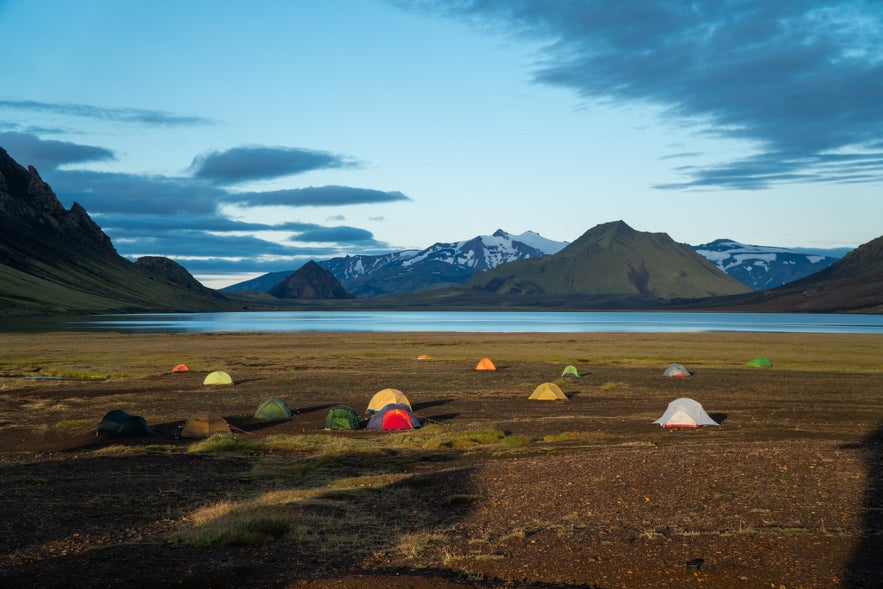 Photo by Pavel Brodsky
Photo by Pavel Brodsky
Commerce Day falls on the first Monday of August and it has been observed in Iceland since 1894. It can also be called the 'Holiday of the Merchants' as it is a day to award shopkeepers and traders a day off.
This bank holiday weekend is called Verslumannahelgi, and many people leave the city to camp or relax in a summer house. There are numerous outdoor festivals which take place around the country featuring live music and fireworks. Young Icelanders especially attend en masse equipped with Icelandic sweaters, guitars and high spirits.
The most famous of these festivals is called Þjóðhatið, the 'National Festival' and it is staged on the picturesque Westman Islands. If you plan to attend, you will need to think ahead as spaces on the ferry fill up fast!
- See also: Camping in Iceland | All You Need to Know
There is a large camping and music festival in Akureyri as well as Innipúkinn (which translates to 'Indoor Imp') within Reykjavík which features live music and an outdoor market
If you find yourself in the Westfjords, you could attend the European Swamp Soccer Championships (Mýrarboltinn), one of the strangest sporting events whereby players battle through a muddy mire to score goals. Visitors are welcome to watch or, if you're feeling brave, you can join in!
Christmas
Much can be said for Christmas in Iceland, enough to fill a whole article in fact, such as this one. There are countless Christmas traditions, many of which are a blend of Christian religious practices and traditional folklore.
The candles and twinkling fairy lights of this period bring an element of joy to these otherwise dark and cold winter months and the Christmas spirit is embraced as early as mid-November. Visiting Iceland in its Yuletide glory is a special experience, guaranteed to leave you feeling warm and cosy on the inside.
Christmas Eve
As in other Nordic countries, Christmas Eve is the principal day of celebration when people open their presents and much more. The official public holiday starts after noon and public transportation in Reykjavík stops at around 16:00. Nearly everything is guaranteed to be closed after this time.
If Icelanders are working in the morning, they will hurry home to prepare for the evening's festivities. Christmas Eve is somewhat of a formal affair, and people will wash and dress-up for the occasion. The interior and exterior of peoples' homes will be extensively decorated, and Icelandic Christmas songs will fill the air.
Christmas Eve is generally celebrated at home, and it officially begins at 18:00, marked by the tolling of the bells of Hallgrímskirkja church. This fanfare is relayed on the radio, and families gather to listen in anticipation of the coming Yuletide. Once everyone has wished each other a Merry Christmas (Gleðileg Jól), they will sit down for Christmas dinner.
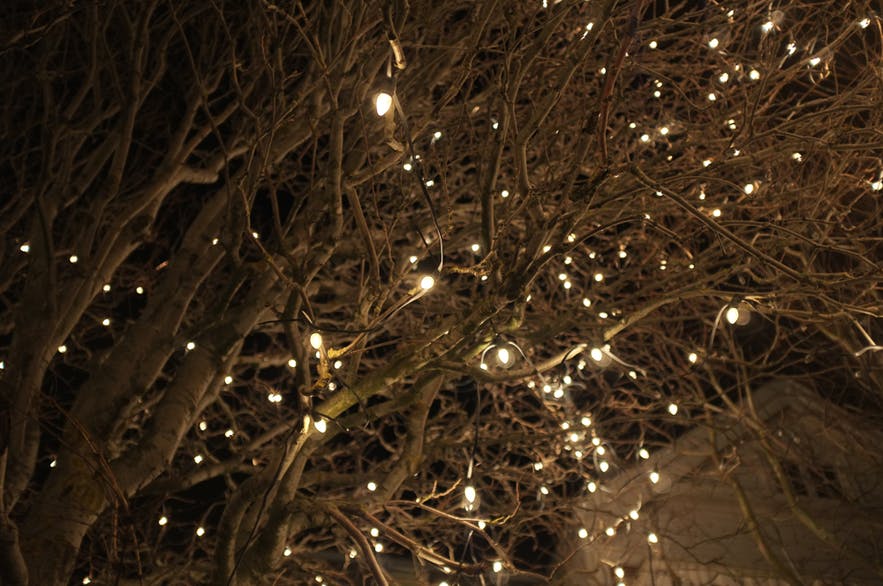 Photo by Lyonel Perabo
Photo by Lyonel Perabo
Traditional Christmas dishes include ptarmigan (rjúpa), smoked lamb (hangikjöt), smoked pork (hamborgarhryggur), and sometimes reindeer, accompanied by pickled red cabbage and other sides. This is washed down with a non-alcoholic Christmas drink called Christmas Ale (jólaöl) which is a mixture of an Icelandic orange soda (Appelsín) and a syrupy malted beverage (straight-forwardly called 'Malt').
Once dinner is finished (and the dishwasher stacked if your parents were particularly cruel) it's time to open the presents. It is traditional for Icelandic children to receive a piece of clothing for Christmas otherwise, they are in danger of being devoured by the dreaded Christmas Cat.
The Christmas Cat is the feline companion of the feared trolless Grýla who likes nothing better than to feast on naughty children after cooking them in a large cauldron. She is much feared by Icelandic children and an effective bargaining tool to encourage them to behave.
Grýla is also mother to the 13 Yule Lads, mischievous characters who come down from the mountains at Christmas to give good children presents and shun the naughty with rotten potatoes. Yes, that's right, in Iceland, we have 13 Santa Clauses.
Once all the presents are open, families relax and plays games or watch a movie while the children play with their new toys. Religious Icelanders will attend a Midnight Mass.
Christmas Day
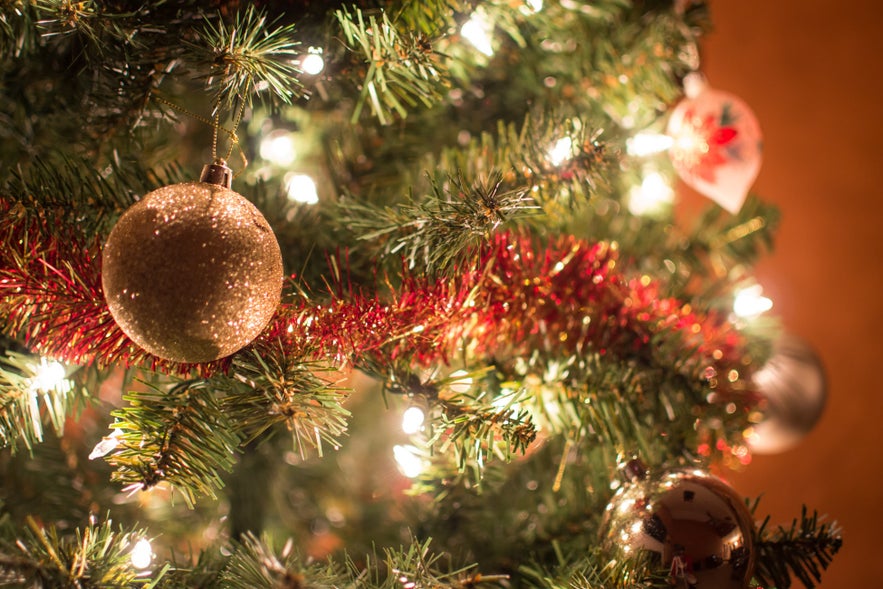 Photo by Sapan Patel
Photo by Sapan Patel
The whole of Christmas Day is a bank holiday and Icelanders usually spend it with family playing games or watching films. Some will use this day to indulge in festivities with extended family, attending large buffets at a relative's house or hosting one themselves. Many choose to go for a Christmas walk to burn some of those over-indulgent calories.
You can expect supermarkets and shops to be closed, but more bars and restaurants will be open than the night before. It is recommended that you book tables in advance.
After plenty of family time, many choose to go out partying in the nighttime as the bars are open late and people don't have work the next day.
Boxing Day/Saint Stephen's Day
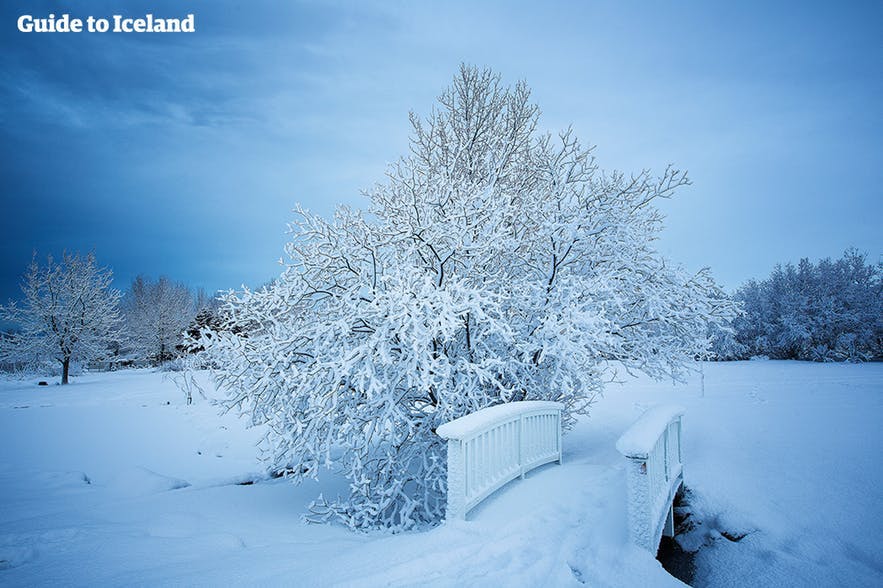
The 'Second (day) of Christmas' (annar í jólum) is also a public holiday, and it is savoured in a very similar fashion to Christmas Day. Supermarkets will still be closed, but restaurants and bars in the centre of Reykjavík will mostly function as normal.
Traditionally, dancing and other outward signs of merriment were strictly banned over the Christmas period. The 26th was the date that dancing was once again allowed in public.
New Year's Eve
Reykjavík has to be one of the best places in the world to celebrate New Year's Eve. Anyone can light fireworks, and many do, resulting in one of the most magnificent and breath-taking informal firework displays you could ever hope to see.
Just like Christmas Eve, the afternoon of the 31st is a bank holiday and public transport in Reykjavík usually runs until 16:00. Shops will be closed, and you will have to make dinner reservations if you plan on eating out.
Icelanders will enjoy a lavish multi-course meal with family before heading out to feel the warm glow of a bonfire. New Year's Bonfires (Áramótabrennur) are lit all over the country and, following an age-old tradition of burning away the old year to welcome the new. It's an opportunity to share in festivities with neighbours and friends while keeping warm in front of the fire.
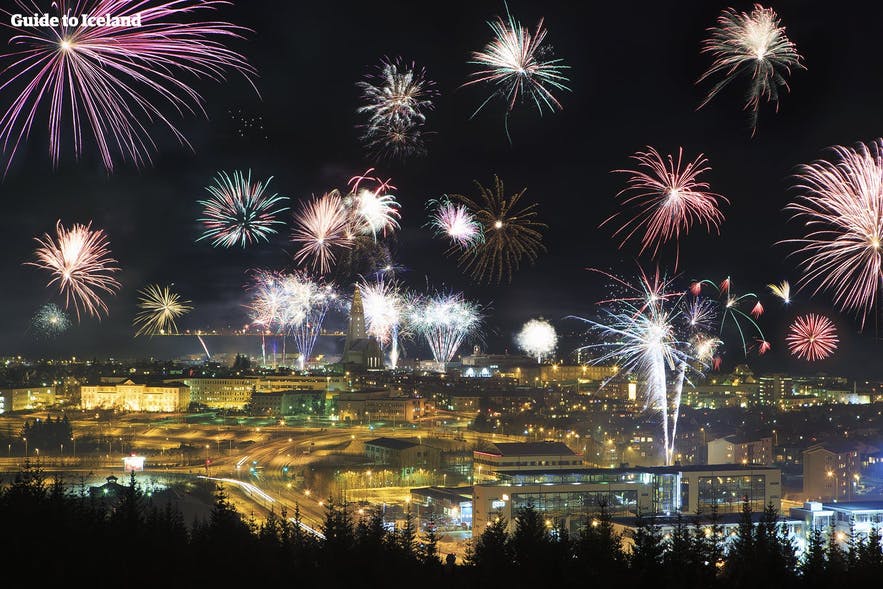
Celebrate New Years like a true Icelander and join a bonfire and firework tour as well as a slap-up meal in one of Reykjavík's top restaurants here.
You can hear the rumble and squeals of fireworks throughout the evening but silence descends promptly at 22:30 as the Áramótaskaup (or 'skaupið') begins, a comedy sketch show that comments upon the year's events. This 50-minute satire has been running since 1966, and over 90% of the Icelandic population dutifully tune in every year.
As soon as Áramótaskaup finishes, the real fireworks show begins with the bulk of explosives peak in the half an hour after Midnight. It's a good idea to try to get to higher ground to marvel at this awesome display. Alternatively, you could enjoy the outlandish view from the water on this fantastic New Year's cruise.
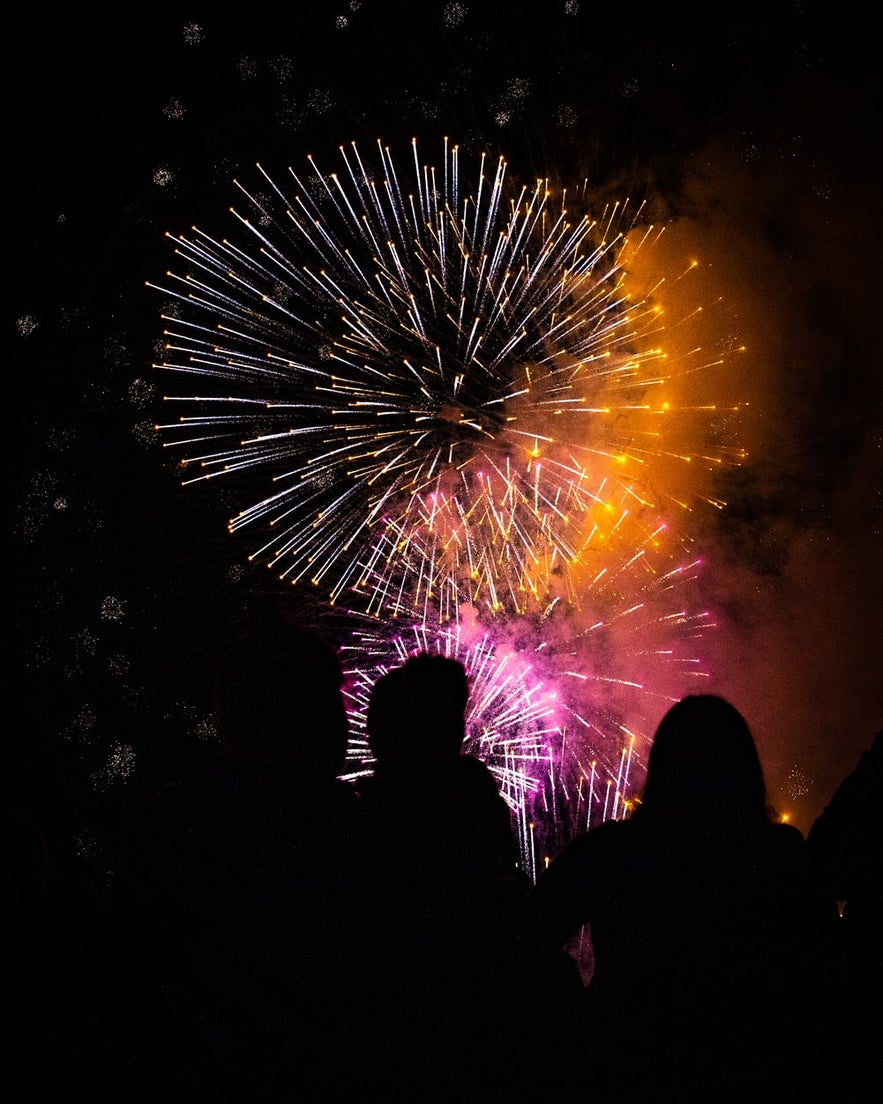 Photo by William Sinclair
Photo by William Sinclair
Shortly after Midnight, most bars open their doors, and people leave their families to partake in one of the biggest parties of the year. Icelanders meet friends to drink, dance and discuss the skaupið and don't stop until the next morning. Be prepared for one of the wildest parties of your life!
In folklore, New Year's Eve is thought to be a mystical evening in which the dead can rise from their graves, and magical mischief-makers such as elves and 'hidden people' are highly active. Traditionally, Icelanders would leave the lights on, and their doors unlocked to encourage a visit from these mystical creatures, considered good luck for the coming year.
Are you considering visiting during one of these public holidays? What are your experiences of festivities in Iceland? Did you find this article useful? Make sure to leave your thoughts and queries in the Facebook comments box below.
บทความอื่นที่น่าสนใจ
นิวเยียร์อีฟส่งท้ายปีเก่าที่ไอซ์แลนด์
นิวเยียร์อีฟหรือวันส่งท้ายปีเก่าที่ไอซ์แลนด์เป็นอย่างไร นิวเยียร์อีฟที่เรคยาวิกเป็นแบบไหน อะไรที่ทำให้นิวเยียร์อีฟหรือวันสุดท้ายก่อนขึ้นวันปีใหม่ที่ไอซ์แลนด์เป็นวันสุดพิเศษ และนิวเยียร์อีฟปาร์ตี้สุดเจ...อ่านเพิ่ม
อาหารไอซ์แลนด์: คู่มือแนะนำวัฒนธรรมการกินในไอซ์แลนด์
กินอะไรในไอซ์แลนด์? อ่านภาพรวมที่ครอบคลุมของวัฒนธรรมอาหารไอซ์แลนด์และเรียนรู้เกี่ยวกับอาหารที่แตกต่างกันทั้งหมดที่คุณสามารถลองได้ในขณะที่มาเยือนไอซ์แลนด์ ลักษณะสำคัญของอาหารไอซ์แลนด์คืออะไร? ไอซ์แ...อ่านเพิ่มคริสต์มาสในไอซ์แลนด์ | ประเพณี อาหาร และเรื่องราวเกี่ยวกับคริสต์มาสอีกมากมาย!
เรียนรู้เรื่องราวทั้งหมดเกี่ยวกับคริสต์มาสในไอซ์แลนด์ ประเพณีเกี่ยวกับคริสต์มาสที่สำคัญของไอซ์แลนด์มีอะไรบ้าง ทำไมไอซ์แลนด์จึงมียูลแลด 13 ตน และพวกเขาคือซานตาคลอสหรือเปล่า ชาวไอซ์แลนด์เฉลิมฉลองเทศกา...อ่านเพิ่ม

ดาวน์โหลดตลาดการท่องเที่ยวที่ใหญ่ที่สุดของไอซ์แลนด์ลงในโทรศัพท์ของคุณเพื่อจัดการการเดินทางทั้งหมดของคุณได้ในที่เดียว
สแกนรหัส QR นี้ด้วยกล้องในโทรศัพท์ของคุณแล้วกดลิงก์ที่ปรากฏขึ้นเพื่อเพิ่มตลาดการท่องเที่ยวที่ใหญ่ที่สุดของไอซ์แลนด์ไว้ในกระเป๋าของคุณ ป้อนหมายเลขโทรศัพท์หรือที่อยู่อีเมลของคุณเพื่อรับ SMS หรืออีเมลพร้อมลิงก์ดาวน์โหลด
